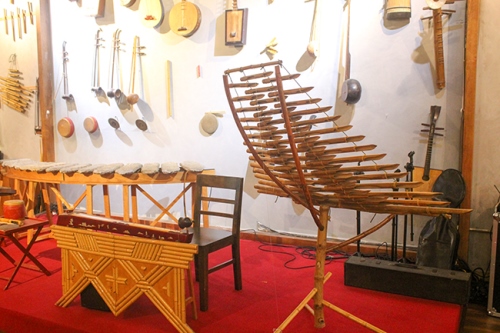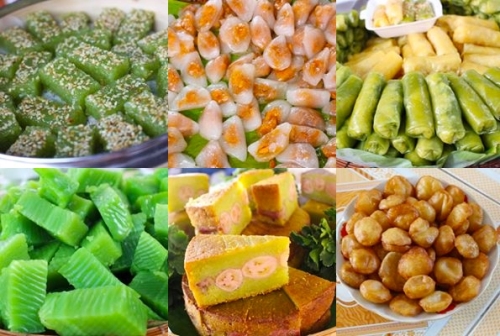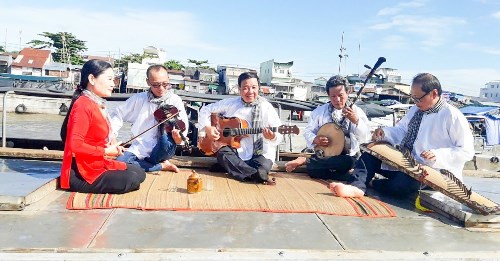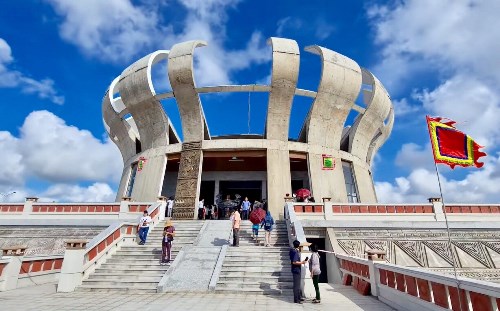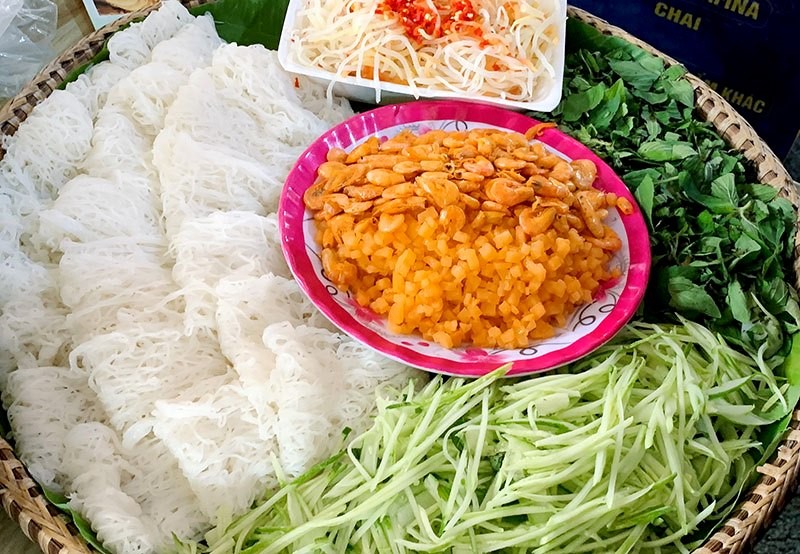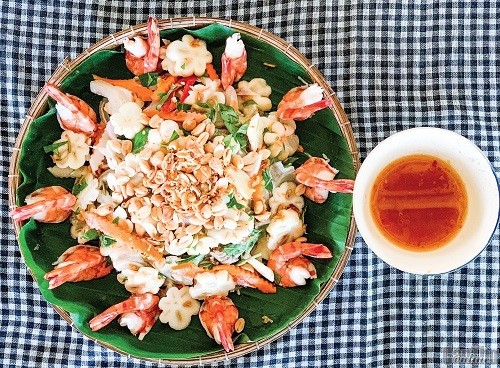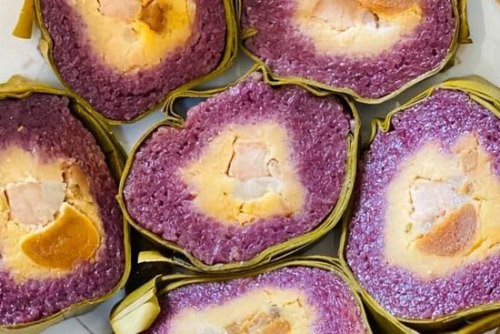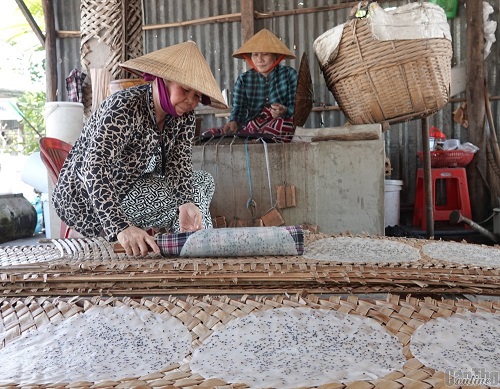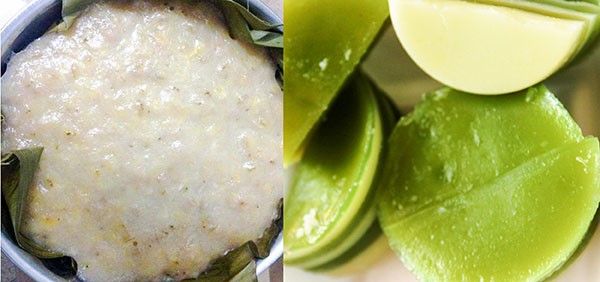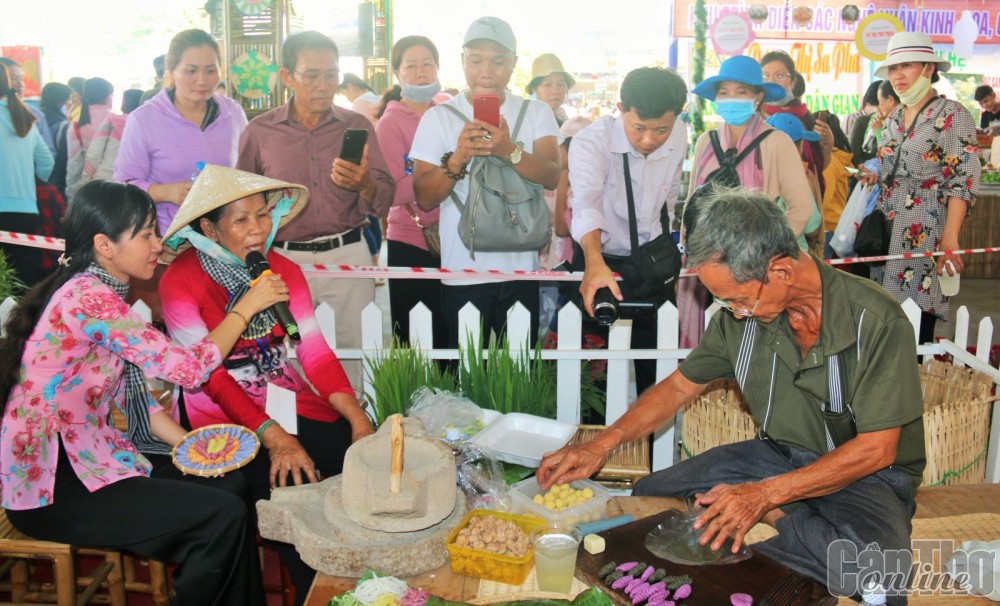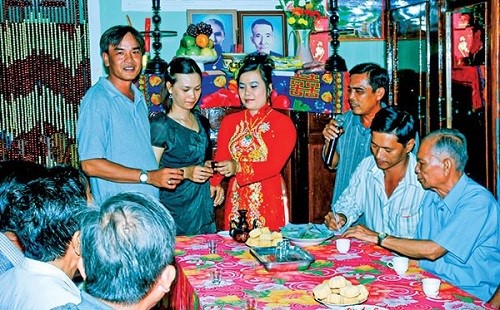
In our meeting, Mr. Thương excitedly informs us that he likes this book a lot since he has written from what he has heard, known, and experienced in his life. According to him, there are unforgettable events imprinted in each individual’s journey of life from the time they are born, brought up, then married ... until they get old, sick, and pass away. Those precious moments are anniversaries and ceremonies on the occasion of being 1-month old, 1-year old, engaged, married, etc., some of which have been preserved and practiced in today’s life while others have no longer existed by time. This procedure is undeniable in life, which causes certain regrets for nostalgic people. “From the memories and experiences of previous researchers, along with what I have been directly involved or heard from the senior locals, I have taken notes in the hope of saving some old-time practices in Southern Hậu River Region,” says a researcher from Sóc Trăng City.
Attracted by his passion, we would like to share some interesting customs in southern Hậu River in this article
►Why do Southern people call their first child the second one?
Unlike the Northern people calling their first son called Cả (the eldest), Southerners in general and those in Southern Hậu River Region in particular, call theirs thứ Hai (the second). The researcher presents three explanations. Firstly, according to the Southwest folk belief, after his succession to the throne, Emperor Gia Long, in memory of his wife Tống Thị Lan and the late prince Cảnh (also his eldest son). From then on, no one dared to call the eldest child Cả. Secondly, in commoners’ belief, the eldest child was an imaginary one who had left to join a gang of robbers before other children were born. On the day he returned home to rob the box of jewelry, he only found his parent's coffin. This is associated with the story “Nhưn quan phá quàn” (now seen in the practice of beating and destroying the coffin before taking the dead to the burial area in this region – the reporter’s note). Thirdly, the headquarter of the Authority Council in the French colonial period had 12 positions, of which Hương Cả was the highest, so commoners did not dare to call their eldest son Cả because of their respect.
►Joy and sorrow of thú phạt ceremony (confession and punishment)

A master of ceremony in a wedding this region 30 years ago
In the past, many families of the region put a lot of emphasis on "arranged marriage" and "suitable alliance” in wedding ceremonies, which caused a lot of love afflictions. Sometimes lovers without permission from parents of both (or one) families had to decide their own life. Typical ways were as follows: they left to other places to live with each other, which was sometimes as a way to put both families in the situation of “a thing done and not reversible”; or the man took his lover home disregarding parental consent. Therefore, there are common sayings about this such as "He did not hold a wedding ceremony at all; he just took his lover home without parental consent" or "The two of them have already left due to your prevention!"
Things done and not reversible made both families try the only way to save their face: thú phạt ceremony (confession and punishment). It was a simple ceremony witnessed by adults from both families. The groom's family had a reputable, "good at talking" person to act as a master of ceremony. Gifts for the bride’s family were a couple of ducks, a tray of wine, and a pair of earrings. For those who were poor and could not afford all gifts, they had to prepare a pair of earrings by all means because they represented the bride’s grace. Even though both families had quarrels and disagreements, they were now in-laws due to their children’s marriage, so they ignored all bad events. According to the author, this ceremony shows the flexibility and kindness of the Southern folks. There is a saying as follows,
“Người ta giàu thì đầu heo nọng thịt
Tụi mình nghèo thì cặp vịt đôi bông”
(If people are rich, their gift for the bride’s family is a fat pig's head.
We are poor, so our gifts are only a pair of ducks and a pair of earrings)
The practice of calling each other "ní"
"Ní" is a word used for a relationship probably only in the South, especially in the south of Hậu River. There are many ways for people to consider others as their ní like the same name, the same age, the same affection...
According to the author’s explanation, the original of this custom was for two friends who were suitable for each other. Becoming Ní procedure including the offerings of a rooster and a bottle of wine was carried out at the temple of Mr. Tà who witnessed their swearing to be friends forever after they killed the rooster and emptied the bottle of wine. Later, this practice could be done at the marriage was also performed at Bà Chúa Xứ temple, or simply at the drinking table, witnessed by a lot of people. They call each other ní, their children call each other siblings ní and call them parents ní. Their grandparents are also called grandparents ní ... Another interesting thing is that those who are ní often do not choose to be each other’s in-laws even though they are not biological relatives.
In this region, ní are like family members who are ready to help each other at any time. However, anything can unexpectedly happen on earth, so some ní may have conflicts that cannot be solved. Then they have to carry out the procedure of “xả ní” (releasing each other from ní relationship) which is similar to the becoming ní one, but it is not happy at all!
The practice of making a coffin from a plank bed in advance!
In the past, the elderly people in the region used to make their coffin ready because of various reasons. For example, they did not want to bother their relatives, or they wanted to save and “prepare everything” gradually due to their financial difficulty...
There used to be a plank bed in most ancient houses where people had meals, took a rest, or received guests. As the head of the family got old, they decided to divide the bed into two parts: one half was used to make their coffin (or normally called cái Thọ_longevity), and the other was left for their children. The finished coffin was put on a high place on the wing of the house and kept away from leaking rain or flooding. It was regularly cleaned by the owner. Some old people were so carefully prepared that they dried the tea leaves after brewing them for tea because they needed to use a lot of tea leaves as ... shrouds. Similarly, female elderly used to pick up fallen dry cotton balls, dried cotton, wrapped, and put it in bags carefully. If their children and grandchildren gave them new clothes, they should save one to wear at their own funeral. This can be clearly seen in the common saying,
“Thế gian còn dại chưa khôn
Sống bận áo rách chết chôn áo lành”
(The human beings are still foolish,
They save the good and beautiful clothes to wear on their own funeral while being alive, they wear ragged clothes.”)
The author concludes that old people did all these practices actions because they did not want to bother their relatives and neighbors who must have been very worried and busy on the day they passed away. Also, this custom reflects old people’s attitude towards the law of life or birth and death.
The author has commented that some practices have been preserved and others disappeared in the southern region of Hậu River. The revision in this article helps remind today's generation of their home country's fine customs and traditions.
Source: Can Tho Newspaper - Translated by Diep Truong





